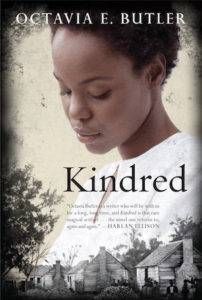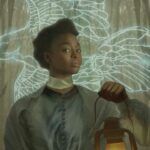
Science Fiction That Isn’t Quite; or, Books to Read if You Loved KINDRED
This is one of numerous posts written today at the Riot in celebration of Octavia Butler’s birthday. See all the posts here.
My first significant memory of Octavia Butler is from college, when I was in a class about representations and intersections of race and sexuality, and we read her Kindred. Kindred is a strange, beautiful, harrowing, painful book in which a black woman in the contemporary U.S. find herself repeatedly and inexplicably drawn back in time to an antebellum plantation.
 For me, the “inexplicably” was so important that, when a friend in the class described the book as “science fiction,” I sidetracked our whole class discussion with a vigorous argument about whether the label applied.
For me, the “inexplicably” was so important that, when a friend in the class described the book as “science fiction,” I sidetracked our whole class discussion with a vigorous argument about whether the label applied.
Him: Of course it’s science fiction–it’s a novel about time travel by a writer who primarily wrote solidly in-genre books.
Me: But the time travel doesn’t involve technology, and that’s a big part of the point!
While I’ll admit that my dislike of science fiction at the time (irrational from the perspective of my current fannish self, but we’ll leave that aside for now) probably colored my response, it was primarily my attachment to the inexplicability of Kindred‘s time travel that drove me to fight. She didn’t travel through time by dint of a machine—there’s no science in this fiction—and that’s absolutely crucial. She didn’t choose to move across timelines but instead was pulled back to the past, it seemed, by virtue of living as a black woman in a country that hadn’t reckoned with its brutal history of enslavement or how that history echoed across time to drown out the present. Slavery was brought near not by technological machines but instead by the vast social machinery of white supremacy that powers the United States.
More than a decade later, with the wisdom that comes from old age, I’m willing to concede that I wasn’t exactly right to reject the “science fiction” label for Kindred. But my friend wasn’t right, either. We were both kinda wrong, because Kindred is a classic of science fiction that isn’t quite science fiction.
In the years hence, this tiny sliver of literature has become my favorite sub-sub-sub-genre. Over and over again, I’ve fallen hard for books that take the plot devices of science fiction—time travel, teleportation, layered spaces and timelines—and, well, remove the devices. All of science fiction is stories about social relations and cultural context (it’s not as though Butler’s other books aren’t social commentary, after all), but these sci-fi-but-not-quite-sci-fi books distill that function to its stark, sparkling quintessence by making the story first and foremost about people and strange ways we live in the world.
If you haven’t yet read Kindred, then for god’s sake start there. But if you’ve read it and were left intrigued, here are three of my favorite examples of this genre within a genre:
 The City and the City by China Miéville: China Miéville is always a go-to when we’re talking about the quirky boundaries of genre, and The City and the City is no exception. This book is a little bit noir detective story, a little bit international spy thriller, and a whole lot of weird. It takes place in a version of our world where a city in Eastern Europe and a city in the Middle East somehow actually occupy the same exact space, layered atop one another even as each insists (on pain of punishment) that its residents refuse to see the other. By having a murder mystery and diplomatic crisis play out in this strange setting, but without worrying too much about the mechanisms that caused or continue the layering, Miéville manages to build an engrossing story and striking exploration of bureaucracy, geography, and xenophobia.
The City and the City by China Miéville: China Miéville is always a go-to when we’re talking about the quirky boundaries of genre, and The City and the City is no exception. This book is a little bit noir detective story, a little bit international spy thriller, and a whole lot of weird. It takes place in a version of our world where a city in Eastern Europe and a city in the Middle East somehow actually occupy the same exact space, layered atop one another even as each insists (on pain of punishment) that its residents refuse to see the other. By having a murder mystery and diplomatic crisis play out in this strange setting, but without worrying too much about the mechanisms that caused or continue the layering, Miéville manages to build an engrossing story and striking exploration of bureaucracy, geography, and xenophobia.
 Exit West by Mohsin Hamid: This book, just released this March, is revelatory. As a civil war breaks out in an unnamed country, and conflict rages around a world at constant low burn, doors open that allow immediate transit between far-flung places. Slowly and then all at once, people in conflict zones use the doors to travel to London, to Greece, to Marin County, and beyond. Building a love story atop this premise, Hamid makes the doors both secondary—as with Kindred, this isn’t a book about the means as much as the meaning—and a crucial lens through which to see the human experience of the refugee crisis.
Exit West by Mohsin Hamid: This book, just released this March, is revelatory. As a civil war breaks out in an unnamed country, and conflict rages around a world at constant low burn, doors open that allow immediate transit between far-flung places. Slowly and then all at once, people in conflict zones use the doors to travel to London, to Greece, to Marin County, and beyond. Building a love story atop this premise, Hamid makes the doors both secondary—as with Kindred, this isn’t a book about the means as much as the meaning—and a crucial lens through which to see the human experience of the refugee crisis.
 Life After Life by Kate Atkinson: Less sharp in its social commentary than Kindred or Exit West, Atkinson’s novel nevertheless manages to upend time travel tropes to offer a new way of looking at the world. The novel follows a woman whose life, whenever she dies, starts over from her birth. Remnants of previous timelines live on in echoes and instincts as she grows up, sometimes, to experience the London Blitz or Nazi Germany. It’s a beautiful, intricately structured book unconcerned with the hows of the protagonist’s situation. Instead, it uses its structure and its narrative to examine misogyny, global war, history, and—at a more meta level—how storytelling works.
Life After Life by Kate Atkinson: Less sharp in its social commentary than Kindred or Exit West, Atkinson’s novel nevertheless manages to upend time travel tropes to offer a new way of looking at the world. The novel follows a woman whose life, whenever she dies, starts over from her birth. Remnants of previous timelines live on in echoes and instincts as she grows up, sometimes, to experience the London Blitz or Nazi Germany. It’s a beautiful, intricately structured book unconcerned with the hows of the protagonist’s situation. Instead, it uses its structure and its narrative to examine misogyny, global war, history, and—at a more meta level—how storytelling works.
Science Fiction Short Story Collections by Authors of Color
Many genre authors from marginalized backgrounds get their start in short fiction. Check out these amazing short story collections by authors of color.
Fear and Butler in America
A reader on the fear of approaching Octavia Butler's work and being wrung apart by her words.
Fierce: The Short Fiction of Octavia Butler
On one reader's Octavia Butler reading experience with synopses of two particularly poignant short stories.
A Smurfette in Science Fiction and Fantasy: Octavia’s Legacy
Octavia Butler was a smurfette of her time, but she had to earn that place. Priya Sridhar discusses the factors that led to the author's success.
LUMINESCENT THREADS: Knowing Octavia Butler Through a Community That Loves Her
Twelfth Planet Press is releasing a collection of letters to Octavia Butler this summer! Get to know her through the words of Butler experts.
Is it Possible to Misread Octavia Butler?
On that common (incorrect) assumption made about Octavia Butler's short story "Bloodchild."
Why Octavia E. Butler is Essential SciFi Genre Reading
Why sci-fi fans should pick up an Octavia Butler book right now.
Writers Inspired by Octavia Butler
More than 5 prolific authors who were inspired by, and spoke upon, the power of Octavia Butler's words.
Science Fiction That Isn’t Quite; or, Books to Read if You Loved KINDRED
On KINDRED and other sci-fi-but-not-quite-sci-fi books that are first and foremost about people and strange ways we live in the world.
Discovering Octavia Butler’s FLEDGLING And Rediscovering Genre Fiction
One reader on how discovering Octavia Butler's FLEDGLING changed her reading life.
5 Science Fiction and Fantasy Women of Color Authors to Read After Octavia Butler
Already devoured all of Octavia Butler's work? Here are five more women of color authors who write mind-blowing science fiction and fantasy.
An Octavia Butler Reading Pathway
Interested in Octavia Butler but not sure where to start? Follow this reading pathway!
Also In This Story Stream
- Science Fiction Short Story Collections by Authors of Color
- Fear and Butler in America
- Fierce: The Short Fiction of Octavia Butler
- A Smurfette in Science Fiction and Fantasy: Octavia’s Legacy
- LUMINESCENT THREADS: Knowing Octavia Butler Through a Community That Loves Her
- Is it Possible to Misread Octavia Butler?
- Why Octavia E. Butler is Essential SciFi Genre Reading
- Writers Inspired by Octavia Butler
- Discovering Octavia Butler’s FLEDGLING And Rediscovering Genre Fiction










